Martha Roby: House takes steps to rebuild our military
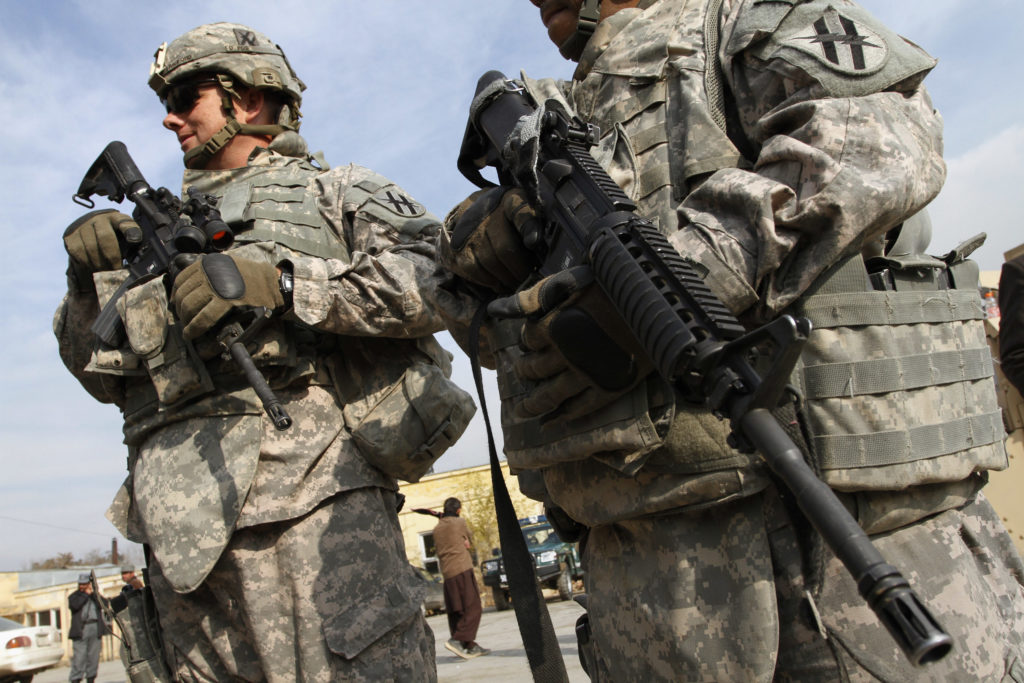
Over the last year and a half, our unified government has taken big steps to unleash our economy and foster growth here in the United States. Because of this work, our economy is strong today. In fact, since the enactment of our historic tax overhaul six months ago, more than one million new jobs have been created. Because of this work, businesses are growing, Americans are working, and our economy is strong. Now, we must do the work required to ensure that our military is strong, too, especially after the damaging sequestration cuts and funding limitations put into place by the Obama Administration. As a member of the Defense Appropriations Subcommittee, I have been grateful to have a seat at the table as we’ve worked to properly fund our military through H.R. 6157, the Department of Defense Appropriations Act, which recently passed the House of Representatives by a vote of 359-49. I was proud to vote in favor of the legislation, and I spoke on the House floor to urge my colleagues to support it, too. Alabama’s Second District is home to two of our nation’s finest military installations, Maxwell-Gunter Air Force Base in Montgomery, and Fort Rucker down in the Wiregrass. I am especially glad that this funding bill provides the resources to support their critical missions. H.R. 6157 contains an overall amount of $674.6 billion in military funding. This amount covers important funding for Army Aviation programs important to Fort Rucker, including resources for four additional Lakota helicopters, 58 additional Blackhawk helicopters, and 66 additional Apache helicopters. The bill also provides support for other key Alabama programs, including additional funding for a total of three Littoral Combat Ships that are built in Mobile, resources to upgrade the Stryker Vehicle, and strong funding for missile programs, including THAAD, Hellfire, and LRASM. Also importantly, the bill allocates funding for 93 F-35 aircraft, some of which will soon be flown by the 187th Fighter Wing at Dannelly Field in Montgomery. This bill is of critical importance to our national security and the missions in Alabama’s Second District. By passing this legislation, the House has kept our promise to rebuild our military and support our servicemembers. I’d like to share a few more reasons why this bill is so very important. First, it provides a 2.6 percent pay increase to our men and women in uniform – the largest raise they have received in nine years. Our service-members sacrifice their own personal safety to protect us, and they deserve this pay raise. Second, the bill allocates $34.4 billion for the Defense Health Program so troops, their families, and retirees can receive the care they need. This program includes funding for cancer research, psychological health research, and more. Third, it addresses our military readiness problem. It is no secret that our military faced damaging cuts under the Obama Administration that have significantly hindered readiness. This bill makes investments in training, maintenance, and other military readiness programs. Fourth, the bill upgrades our military equipment. The legislation provides more than $145 billion to upgrade and secure military equipment across all branches of the military, including replenishing our Naval fleet. Fifth, this legislation supports counterterrorism efforts. The bill directs funding towards our military’s current operations against terrorist organizations by supporting additional personnel, facilities, and equipment. Our country still faces real and serious threats across the globe, and it is imperative that we enable the Pentagon to not only plan for today, but to be prepared for emerging threats around the world. The bottom line is that the Fiscal Year 2019 Defense funding bill continues our efforts to rebuild our military after several years of harmful cuts and hollowing out. Now, we are making sure the military has the tools and resources it needs to rebuild. One of Congress’ most fundamental constitutional duties is to “provide for the common defense.” This important legislation fulfills that responsibility and ensures that our military not only remains the tip of the spear, but that it grows stronger and well-equipped to face whatever challenges come our way. https://www.youtube.com/watch?v=z5f9vY00kpU ••• Martha Roby represents Alabama’s Second Congressional District. She lives in Montgomery, Alabama, with her husband Riley and their two children.
VA announces grant for Alabama State Veterans Memorial Cemetery at Spanish Fort

The Department of Veterans Affairs (VA) National Cemetery Association (NCA) on Wednesday announced it has awarded the state of Alabama a grant in the amount of $274,393 for the expansion and improvement of the Alabama State Veterans Memorial Cemetery at Spanish Fort. “Our state and tribal partners are critical in helping NCA achieve our strategic goal of providing 95 percent of the Veteran population with convenient access to a burial option within 75 miles of the home,” said Under Secretary for Memorial Affairs Randy Reeves. “We look forward to continuing to work with states like Alabama and provide grants that reflect the needs, resources and preferences of the local Veteran community.” The grant will fund the construction of 430 in-ground cremains gravesite, a memorial wall containing 100 plaques, widened cortege lane, landscape, irrigation and supporting infrastructure. The project will develop approximately 0.5 acres and provide continued service for approximately 56,000 Veterans, spouses and eligible family members. “Great news! The Department of Veterans Affairs has awarded a $274,000 grant for the expansion and improvements to the Alabama State Veterans Memorial Cemetery in Spanish Fort,” Alabama 1st District U.S. Rep. Bradley Byrne posted on Facebook of the news. “This is excellent news for our local veterans and the entire community.” The closest national or state Veterans cemetery to Spanish Fort is Barrancas National Cemetery in Pensacola, Fla. approximately 57 miles away.
Military awards Alabama’s GeneCapture $1 million contract to develop portable disease detector

The Department of Defense has awarded Huntsville’s GeneCapture a $1 million, two-year contract to develop a portable device that war fighters can use to identify disease-causing germs. The Small Business Technology Transfer Research (STTR) contract is from the DOD’s Joint Science and Technology Office for Chemical and Biological Defense. GeneCapture, a resident associate company at the HudsonAlpha Institute for Biotechnology, has developed a “gene signature matching platform” that screens for hundreds of pathogens in less than one hour. The multi-pathogen test is conducted using a small, inexpensive disposable cartridge and can be used to test samples from humans and animals. The technique is being evaluated as a possible solution for a portable infection diagnostic device for use in forward deployed military operations. GeneCapture is collaborating on this contract with Birmingham’s Southern Research, which will provide its expertise in infectious diseases, purifying genetic material for testing and designing clinical trials for the Food and Drug Administration. “It has been a dream of mine to bring this technology to market so that critical diagnostic decisions can be made quickly, which will save lives,” said Krishnan Chittur, chemical engineering professor emeritus at the University of Alabama in Huntsville and co-founder of GeneCapture. The original discovery was patented by UAH and exclusively licensed to GeneCapture. Krishnan Chittur, Ph.D., CTO of GeneCapture, and Art Tipton, Ph.D., President and CEO of Southern Research. The Huntsville company and Birmingham-based research institute will work together on a device to quickly identify diseases for the U.S. military. (contributed) Chittur said the technology uses genetic probes to capture the “signature” of germs. An optical scan identifies which germ is present and produces a result in about 45 minutes. “It’s a completely new technique that would have been impossible without the advances in genetics and genomics discoveries of the last decade,” he said. “That is one of the reasons we are located at the HudsonAlpha Institute for Biotechnology – the research that’s happening here is cutting-edge.” Paula Koelle, chief scientist at GeneCapture and principal investigator for the STTR Phase II contract, will lead the effort to produce the disposable cartridges and desktop analyzer for a set of pathogens selected by the DOD that present potential biological threats to the war fighter. The resulting technology could have uses beyond the battlefield. The portable platform could enable civilian applications, such as rapid infection diagnosis in schools, urgent care clinics, doctors’ offices, nursing homes, veterinary clinics, cruise ships and airports. Southern Research’s proven track record supporting new platforms for detecting and preventing newly emerged and highly dangerous and infectious disease pathogens made the nonprofit the perfect partner on the project. “The opportunity to work closely with GeneCapture is a perfect match for Southern Research,” said Art Tipton, Southern Research president and CEO. “We have a history of reaching out to the life sciences community, which benefits both our state economy and the global healthcare industry. Our infectious disease scientists will produce reference tests and accelerate the clinical testing of GeneCapture’s new platform.” Working for the DOD drives home the sense of urgency when it comes to disease-causing germs around the world. “GeneCapture is focused on reducing the risk we all have of being infected from emerging pathogens and global pandemics – the clock is ticking,” said GeneCapture CEO and co-founder Peggy Sammon. “The GeneCapture team is working diligently to bring an affordable, portable solution to this critical problem by connecting with disease experts around the world to incorporate their needs into this product.” Republished with permission from the Alabama NewsCenter.
Martha Roby: House takes step to “provide for the common defense”
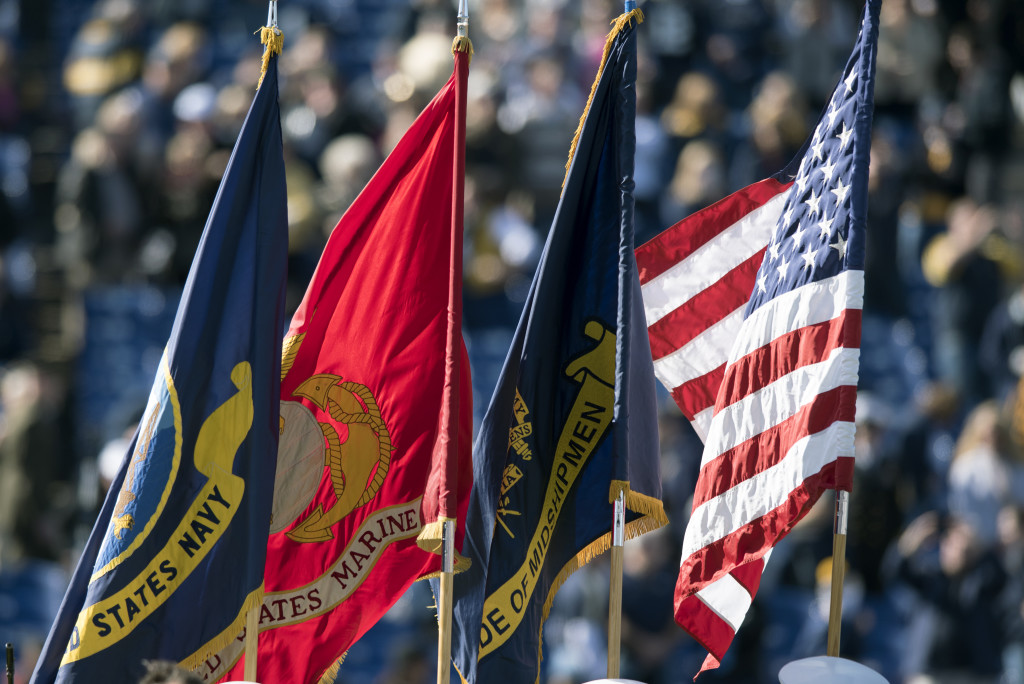
Each year in Congress, I have the honor of nominating distinguished young men and women in Alabama’s Second District for appointment to our nation’s service academies. And each year, I am blown away by these impressive students who are eager to serve our country. I was proud to recently announce my 2018 appointments to the United States service academies – the U.S. Air Force, Naval, Military, and Merchant Marine Academies – and I am looking forward to seeing all the great things these outstanding young men and women accomplish for our country and for their communities. I was truly pleased to nominate the following students who then received official appointments to one or more of the academies: Kaitlin Ann Carpenter, a graduate of Holtville High School, is the daughter of Homer and Kristen Carpenter and Catherine Carpenter. She received an offer of appointment to the United States Naval Academy. Laurence McGrane Dowd, a graduate of Northview High School in Dothan, is the son of John and Donna Dowd. He received an offer of appointment to the United States Military Academy at West Point. Jared Dixon Dykman, a graduate of Enterprise High School, is the son of Dixon Dykman. He received offers of appointment to the United States Military Academy at West Point, the United States Air Force Academy, and the United States Naval Academy. Stephen Carlos Guerrero, a graduate of Prattville High School, is the son of JC and Suzanne Guerrero. He received an offer of appointment to the United States Air Force Academy. Jailyn Mykayl Holt, a graduate of Loveless Academic Magnet Program (LAMP) in Montgomery, is the daughter of Edward and Jurilyn Holt. She received an offer of appointment to the United States Air Force Academy. Chandler Cross Jones, a graduate of Andalusia High School and Marion Military Institute, is the son of Troy Jones. Chandler received an offer of appointment to the United States Military Academy at West Point. Connor Michael Rainey, a graduate of Prattville High School and Marion Military Institute, is the son of George and Janet Rainey. He received offers of appointment to the United States Air Force Academy, the United States Military Academy at West Point, and the United States Merchant Marine Academy. It goes without saying that we have some incredibly bright, talented students in the Second District. These men and women are to be commended for their willingness to serve, their academic excellence, and their unique leadership abilities. I am thrilled to join their families, friends, teachers, and communities in celebrating their outstanding accomplishments. As these students prepare to enter into military service in a few years, it is critical that we properly fund our military to ensure that they have all the tools they need to do their jobs. The world is a dangerous place, and we face very real threats from around the globe. I am confident that these young men and women from our district will do all they can to ensure our military remains the tip of the spear, but this must also come with the commitment from Congress that we will make sure our troops are properly supported, especially when we send them into harm’s way. I’m proud to report that the House recently passed H.R. 5515, the National Defense Authorization Act (NDAA) of 2019, the annual bill that authorizes funding for military programs throughout the Department of Defense. I was proud to support the NDAA, and I look forward to seeing President Trump sign this legislation into law. Congress has a constitutional duty to “provide for the common defense” by equipping our Armed Forces with everything they need to fight the enemy, deter threats, and ultimately keep us safe. I am proud that the House followed through on this critically important responsibility for the sake of the entire military and the young men and women from Alabama’s Second District who will soon serve our country after pursuing their educations from our prestigious military academies. In Congress, I consider it one of my greatest responsibilities to support our men and women in uniform, and I will never stop working to ensure our Armed Forces receive proper funding. ••• Martha Roby represents Alabama’s Second Congressional District. She lives in Montgomery, Alabama, with her husband Riley and their two children.
Alabama delegation votes to pass major VA overhaul; Trump expected to sign into law
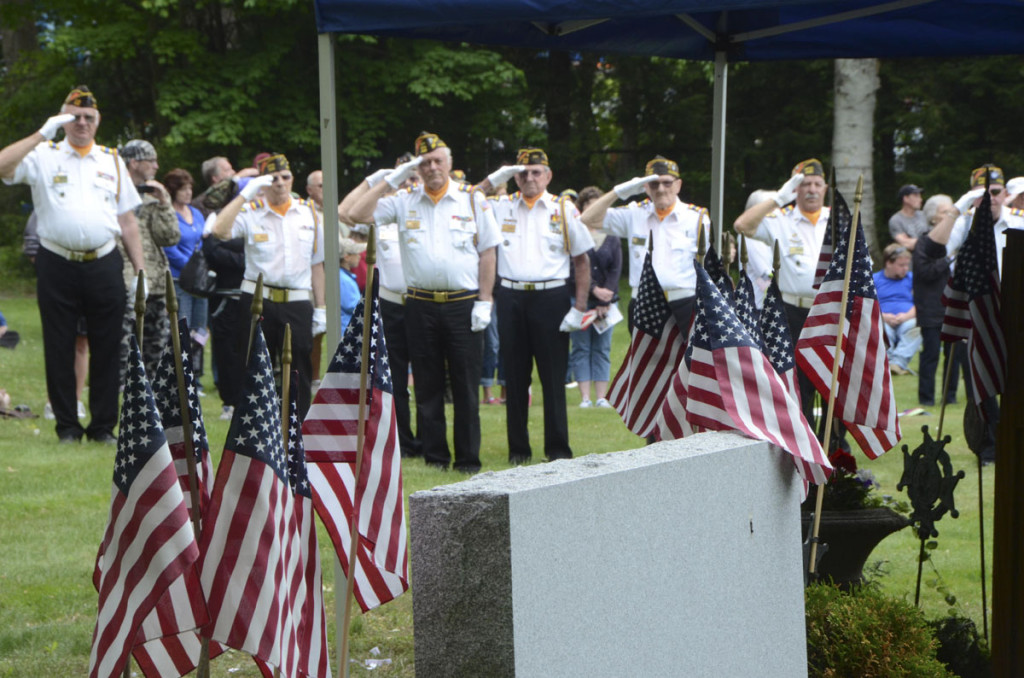
With the support of the entire Alabama delegation, S. 2372: the VA MISSION Act of 2018 has passed both chambers and is now heading to President Donald Trump’s desk for his signature. The legislation – which puts the needs of veterans first by giving them the option of seeking care when and where it makes the most sense for their needs – combines provisions from fifteen different Senate-introduced bills, building upon the success of the Veterans Choice Act. The bill combines the VA’s multiple community care programs into one streamlined program, improves incentives to recruit, hire, and retain qualified medical professionals, and expands the VA’s Post-9/11 Caregiver Program to all eras. Dozens of veterans and military service organizations across the country endorsed the bill. Here’s what the Alabama delegation had to say about their votes and the legislation: Sen. Richard Shelby I am honored to support this milestone legislation that prioritizes brave veterans in Alabama and across the nation. This bicameral, bipartisan bill provides veterans with necessary access to efficient, timely, and quality health care services. As Members of Congress, it is our job to ensure the proper care of those who have risked their lives to protect our freedoms. 1st District U.S. Rep. Bradley Byrne: Another major piece of legislation is headed to President Trump’s desk for his signature. The VA MISSION Act consolidates the VA’s Community Care Program, opens the VA Caregivers Program to serve all veterans, and provides $5.2 billion to fund the VA Choice Program. Simply put, this bill increases access to care at the VA, including walk-in clinics that may be more convenient and immediate in addressing the needs of our veterans. 2nd District U.S. Rep. Martha Roby: By passing the VA MISSION Act, the House has taken another important step toward improving access to care for our nation’s veterans. This legislation addresses a number of important pieces of the large VA puzzle, including extending funding for the Choice Program that countless veterans depend on to receive care. I believe this bill will reduce the bureaucracy associated with veterans seeking private sector health care and improve the lives of those who have served our great country. I’ve heard from countless veterans in Alabama’s Second District about the continued need for VA changes to ensure they get the best care available. I hope we will soon see this legislation signed into law.
Women-owned Huntsville company lands $47M government contract

A women-owned small business (WOSB) headquartered in Huntsville, Ala. has been awarded a $47 million government contract to manage cybersecurity risk operations for the U.S. military’s Defense Health Agency (DHA). Sentar announced they received the contract on Tuesday. They competed against 11 other bidders for the contract in a small business set aside competition. Sentar previously held the contract with DHA, but it ended this month after two years. Work on the new contract will begin immediately within a one-year base period and two, one-year option periods. “Winning repeat business represents proven and enduring customer satisfaction, trust, and confidence from the company’s government customers,” said April Nadeau, VP (DHA, SPAWAR, Navy and Marine Corps). “We are thrilled for the latest re-compete win and look forward to our continued partnership with the Navy and its sponsor organizations.” Sentarwas founded in 1990.
Kay Ivey signs five bills focusing on military, veterans, and their families
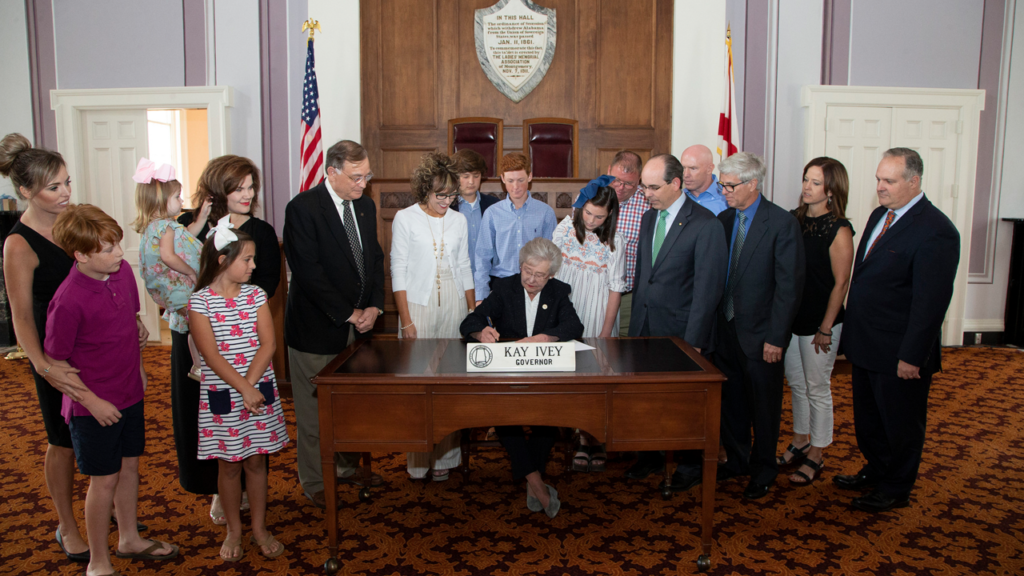
Governor Kay Ivey signed four bills — House Bills 58, 83, 88 and 92 — supporting veterans and the military during a bill signing ceremony at the state capitol Monday. Earlier this month at Maxwell Air Force Base, she also signed into law House Bill 388, the Military Family Jobs Opportunity Act. “Throughout my career, I have advocated for our service men and women, and I will continue to do all I can as governor to offer my support to those who have given us so much,” Ivey said. “Alabamians are steadfast in their support for the military, and I am proud to strengthen Alabama’s bond with the military through these five bills I have signed into law.” Parks for Patriots Bill HB 58, grants free admission to active or retired service members, who are Alabama residents, to state parks operated by the Department of Conservation and Natural Resources. An appropriate active or retired military identification card, a driver’s license with a military veteran designation, a valid Department of Defense Form or any other documentation prescribed by law or administrative rule must be shown to obtain free admission. In November 2017, Ivey announced that entry into Alabama’s State Parks was free for all veterans. At that time, Rep. Dickie Drake said he planned to file a bill in the 2018 Regular Session that would permanently codify Ivey’s Parks for Patriots plan into law. “I am so proud to have sponsored a bill that allows veterans and current military to have free admission to Alabama State Parks,” Drake said. “With Memorial Day close at hand, this should be something nice for our Veterans and our military who have given so much and make so many sacrifices; we can never fully repay them!” Veterans Employment Act and Competitive Bidding for Vets Bills Ivey also signed HB 83, the Veterans Employment Act and HB 88, which gives preference in competitive bids on state government contracts to businesses owned by veterans. Drake also sponsored HB 88. Meanwhile, Rep. Connie Rowe sponsored the Veterans Employment Act, which gives a tax credit to small businesses that hire unemployed veterans. “This was an opportunity to help both our veterans and small businesses at the same time. Incentivizing the hiring and retention of our military veterans by Alabama small businesses allows us to acknowledge their service and provide them with more job opportunities,” explained Rowe.. “Small businesses will benefit, not only by qualifying for the tax incentive, but also by bringing employees into their businesses with the admirable traits and skills acquired during military training and service. It’s a win-win piece of legislation.” Windshield placards for vets HB 92, sponsored by Rep. Barry Moore, allows a person who meets the military service and award requirements to be issued a windshield placard displaying an appropriate military honor or veteran status. The placard will permit parking in designated military parking places. The bill makes it unlawful for a person to park in these designated military places without distinctive placard. “In our great nation, we recognize that freedom is a right given by God, but we also know that right is protected by those who fight for it,” Ivey concluded. “I am grateful for the hard work and support of the Alabama Legislature for passing strong legislation supporting our service men and women.” Military Family Jobs Opportunity Act Earlier this month at Maxwell Air Force Base, Ivey signed into law HB 388, the Military Family Jobs Opportunity Act. Through this bill, professional licensing boards are required to issue licenses and certificates to military spouses who hold licenses and certificates from other states. In the case a state has lesser requirements, the state will issue temporary licenses. Sen. Gerald Dial and Rep. Thad McClammy were the sponsors of the legislation.
Will Ainsworth: Alabama must do more to thank its military veterans
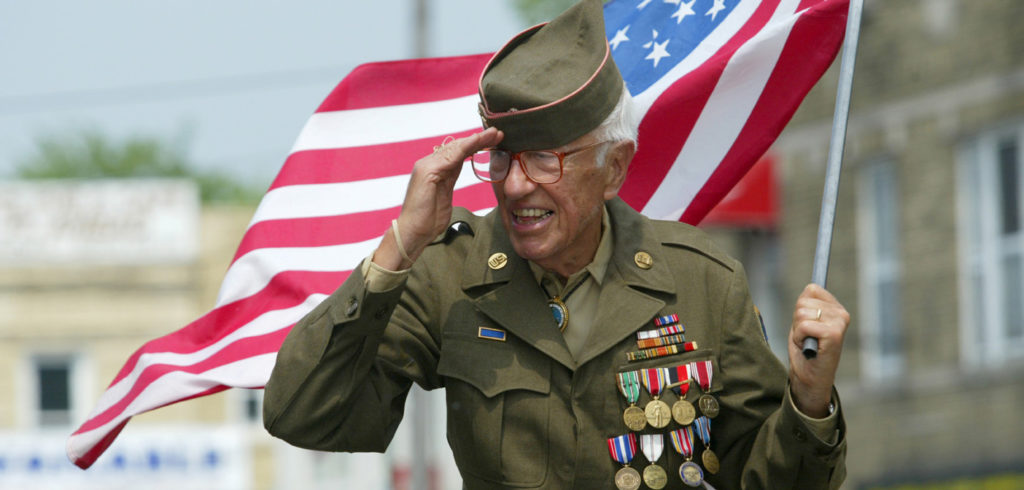
The Bible verse Isaiah 6:8 reads – Then I heard the voice of the Lord saying, “Whom shall I send? And who will go for us?” And I said, “Here am I. Send me!” Those words from the holiest of books have always prompted me to think of the men and women who have so selflessly served in the United States military and defended the greatest of all nations. Military service is a deep commitment that demands a great deal of sacrifice from the soldiers who serve and the family members who support them. Everyone who wears our country’s uniform deserves our respect, honor, and appreciation, and those warm feelings continue even after that uniform is removed and hung in a closet. Since joining the Alabama Legislature in 2014, I have placed a deep focus on serving the needs of Alabama’s military veterans, and that commitment will continue if I am elected lieutenant governor. Most recently, I worked with State Rep. Dickie Drake (R – Leeds) and members of the House Military and Veterans Affairs Committee to pass the Parks for Patriots Act, which provides free, year-round admission to all Alabama state parks for active military personnel and veterans, including members of the National Guard and Reserves. I also joined with State Rep. Barry Moore (R – Enterprise) to pass legislation that makes it a crime for those who do not qualify to park in spaces specifically reserved for Purple Heart and medal of valor recipients, former prisoners of war, or other military veterans. More and more businesses are setting aside special parking spaces reserved for military veterans who were wounded, taken prisoner, or presented a medal for valor in defense of our country. It is unconscionable to think that someone who does not fall under these categories would park in a space reserved for our nation’s heroes, but it happens quite often. This new law will ensure that those who display such blatant disrespect will be punished appropriately. My Republican colleagues and I have also approved the Veterans Employment Act, which provides tax incentives to businesses that hire honorably discharged veterans who are currently unemployed. The law ensures that the veterans covered by this incentive program would be hired for full-time jobs and earn at least $14 per hour, and because the program is modeled after the “pay as you go” method of awarding economic incentives, it will have no negative fiscal impact on the budgets. And in order to ensure that the sacrifices and legacies of veterans of the past, present, and future are properly protected, I was proud to support the Alabama Memorial Preservation Act, a measure that prevents those with leftist agendas and politically correct notions from tearing down statues, monuments, and makers dedicated to our state’s rich military history. Some may argue that the work we have accomplished is adequate, but I believe that more should still be done to properly thank our veteran heroes for their service. That is why I plan to create the Lieutenant Governor’s Task Force on Veterans’ Needs if I am elected to serve the citizens of Alabama over the next four years. This task force will include a cross section of career military veterans, National Guard veterans, disabled veterans, combat and homefront veterans, business leaders, educators, and other citizens. The task force will be responsible for recommending need laws, programs, and initiatives that will ensure Alabama’s veterans and their families are skilled, educated, employed, and provided the comforts necessary to understand the thanks of a grateful state. As lieutenant governor, I will take the most worthy recommendations of the task force to the members of the Senate and work to enact them into law. And because the needs of veterans continue to evolve with a changing economy, emerging technologies, and shifting military responsibilities, the task force will continue to meet on an annual basis and provide new input and ideas. George Washington, our nation’s first president and one of its greatest generals, stressed the importance of treating our veterans well when he said, “The willingness with which our young people are likely to serve in any war, no matter how justified, shall be directly proportional to how they perceive the veterans of earlier wars were treated and appreciated by their nation.” Those are wise words spoken by a great man, and I pledge to live by them as your lieutenant governor. ••• Guntersville-Republican, State Rep. Will Ainsworth is a candidate for lieutenant governor. Elected to the Legislature in 2014, Ainsworth currently represents Alabama’s House District 27, which includes portions of Marshall, DeKalb, and Blount counties.
Martha Roby: Highlighting productive discussions with military leaders

Serving on the House Appropriations Committee gives me a valuable and unique opportunity to participate in the conversations surrounding funding for the various functions of our federal government. It’s hard to believe it, but the debates on funding for the Fiscal Year 2019 have already begun. I’ve been glad to be part of these important discussions and advocate for programs that are critically important to the State of Alabama and our country as a whole. Recently the Defense Appropriations Subcommittee, on which I’m grateful to serve, held hearings to review the Fiscal Year 2019 budget requests from various services. So far during this budget request season, our subcommittee has heard from the Navy and the Marine Corps, the Air Force, and the Army. I was glad to take part in all these discussions for several reasons. I have always been a strong advocate for properly supporting our military so that our men and women in uniform have everything they need when we send them into harm’s way. Secondly, our state and district have a very large military presence, and I consider fighting for our interests one of my greatest responsibilities in Congress. When the Air Force testified before Defense Appropriations, I was glad to have the opportunity to have a conversation with Secretary of the Air Force Heather Wilson and Chief of Staff General David Goldfein. You may remember that Secretary Wilson was the key decision maker for the F-35 mission. We talked about the Air Force’s priorities for the next year, and I thanked her in person for making the decision to send the F-35 Joint Strike Fighter to the 187th Fighter Wing at Dannelly Field in Montgomery. As I told Secretary Wilson, the men and women of the 187th could not be more thrilled about this extraordinary opportunity, and our entire state and community share in this excitement. When the Navy and Marine Corps came before the subcommittee to discuss their budget request, I asked Chief of Naval Operations Admiral John Richardson about the F-35 mission’s potential to enable the Navy fleet as a whole to be more capable. I was thrilled when he assured me that yes, this would definitely be the case. In my role on the Appropriations Committee, I will also continue to support the Littoral Combat Ship (LCS) program manufactured in Mobile as well as the other important priorities for our state. During the Army’s testimony before Defense Appropriations, I reviewed the Army’s budget request with Secretary of the Army Dr. Mark Esper and Chief of Staff General Mark Milley. The people of Southeast Alabama care greatly about the Army, and we are so proud that our very own Fort Rucker is the home of Army Aviation. Unfortunately, the Fiscal Year 2019 budget request for Army Aviation aircraft is significantly reduced from this year, so I pressed Secretary Esper about this. I appreciated his response and his assurance that operations will proceed as usual at Fort Rucker. This news on top of the announcement we recently received that 17 Lakota helicopters will soon be added to the fleet at Fort Rucker are both great indications that this proud military installation in our backyard will continue to excel for years to come. Of course, in my role on the Appropriations Committee, I will continue push for strong Army Aviation funding. I deeply appreciate these distinguished military leaders for taking the time to review their budgets and priorities with us. Each of these individuals have led lives of dedicated service to our country, and I am grateful to their families for the many sacrifices made on our behalf. I will continue to prioritize the national security of this great nation, and as always, I will never stop advocating for the important work being done in Alabama’s Second District at Maxwell-Gunter Air Force Base and Fort Rucker. ••• Martha Roby represents Alabama’s Second Congressional District. She lives in Montgomery, Alabama with her husband Riley and their two children.
Watchdog report: Failed VA leadership put patients at risk
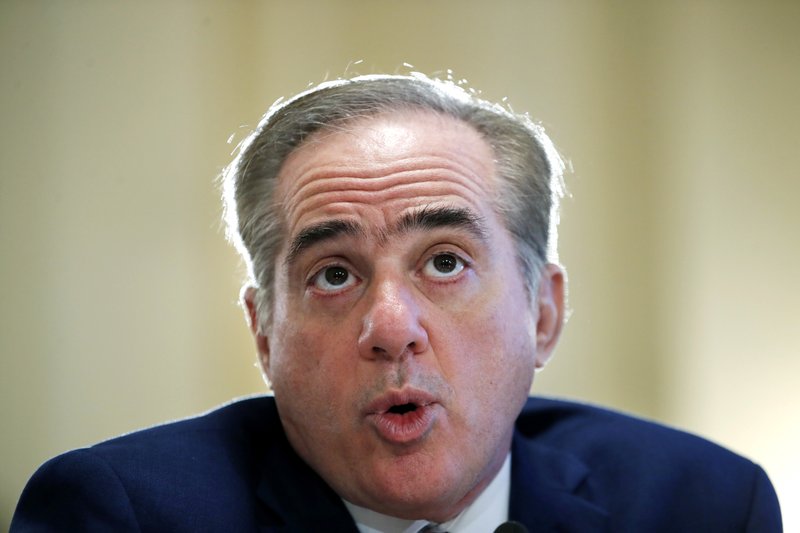
As a top Veterans Administration official in the Obama administration, current Secretary David Shulkin took no action to fix longstanding problems of dirty syringes and equipment shortages that put patients at risk at a major veterans hospital, according to an investigation released Wednesday that finds “failed leadership” and “climate of complacency” at agency. The 150-page report by the VA internal watchdog offers new details to its preliminary finding last April of patient safety issues at the Washington, D.C., medical center. Painting a grim picture of communications breakdowns, chaos and spending waste at the government’s second largest department, the report found that at least three VA program offices directly under Shulkin’s watch knew of “serious, persistent deficiencies” when he was VA undersecretary of health under former President Barack Obama from 2015 to 2016. Shulkin, who was elevated to VA secretary last year by President Donald Trump, told government investigators that he did “not recall” ever being notified of problems. The findings are the latest in a series of problems coming to the light at the VA under Shulkin, who has been struggling to keep a grip on his job since a blistering report by the inspector general last month concluded that he had violated ethics rules by improperly accepting Wimbledon tennis tickets and that his then chief of staff had doctored emails to justify his wife traveling to Europe with him at taxpayer expense. He also faces a rebellion among some VA staff and has issued a sharp warning to them: Get back in line or get out. “I suspect that people are right now making decisions on whether they want to be a part of this team or not,” he said last month. The latest IG investigation found poor accounting procedures leading to taxpayer waste, citing at least $92 million in overpriced medical supplies, along with a threat of data breaches as reams of patients’ sensitive health information sat in 1,300 unsecured boxes. No patient died as a result of the patient safety issues at the Washington facility dating back to at least 2013, which resulted in costly hospitalizations, “prolonged or unnecessary anesthesia” while medical staff scrambled to find needed equipment at the last minute as well as delays and cancellations of medical procedures. The report also noted improvements made at the Washington facility since the IG’s first report in April, when Shulkin replaced the medical center’s director and pledged broader improvements. Still, VA inspector general Michael Missal cautioned of potential problems without stronger oversight across the VA network of more than 1,700 facilities. “Failed leadership at multiple levels within VA put patients and assets at the DC VA Medical Center at unnecessary risk and resulted in a breakdown of core services,” Missal said. “It created a climate of complacency … That there was no finding of patient harm was largely due to the efforts of many dedicated health care providers that overcame service deficiencies to ensure patients received needed care.” In the report, Shulkin responded that he had expected issues involving patient harm or operational deficiencies to be raised through the “usual” communication process, originating from the local level and regional office to VA headquarters in Washington — and that it apparently didn’t happen. While the IG did not make specific conclusions on whether Shulkin actually was warned by direct subordinates, it broadly faulted an “unwillingness or inability of leaders to take responsibility for the effectiveness of their programs and operations,” and cited a “sense of futility” at multiple levels in bringing about improvements. In its written response to Wednesday’s report, the department generally agreed to implement recommendations for improved health procedures at the Washington facility and pledged a “reliable pathway” for local VA and regional officials to report high-priority concerns to senior leadership at VA headquarters. “It was difficult to pinpoint precisely how the conditions described in this report could have persisted at the medical center for so many years,” Missal wrote. “Senior leaders at all levels had a responsibility to ensure that patients were not placed at risk,” he said. Shulkin has maintained White House support despite the travel controversy. He has acknowledged some mistakes in the handling of the trip and said he relied too much on the judgment of his staff to ensure full compliance with travel policies. He has since said he reimbursed the $4,000 plane ticket for his wife. His chief of staff, Vivieca Wright Simpson, has left the agency. Several major veterans organizations are standing behind him as the best guardian of the VA amid a planned overhaul of the Veterans Choice program, a Trump campaign priority aimed at expanding private care outside the VA system. Major veterans groups are wary of an aggressive Choice expansion as a potential threat to the viability of VA medical centers, which it sees as best-suited to treat battlefield injury such as post-traumatic stress disorder. Republished with permission from the Associated Press.
Parker Snider: Alabama can do more for its military families

According to a recent survey, a majority of military family members do not feel that they belong in their local civilian communities. This means that less than half of military families that live in our neighborhoods, shop at our malls, and attend our places of worship feel at home with us. Why is this the case? Perhaps it is because of one of the staples of military life – regular mandated relocation. Members of our military often have little to no say in where they live or how often they move, something they do an estimated 10 times more than civilian families. Nevertheless, they choose to sacrifice their desires and expectations for the good of our country. Anyone who has moved will readily admit that it is rarely an easy task. Along with the logistics of relocating from one area of the country to another, families grapple with leaving friends, schools, and communities they are familiar with for the unknown. Additionally, even though military families move, on average, once every three years, the effects of compulsory relocation are felt yearly. Morgan Kistler, a mother of three and wife to a member of the Coast Guard, quickly learned that “during those three to four years when your family is planted, everyone else around you is not.” Every year, children and parents alike repeat the painful season of goodbyes, regardless of whether or not they are the ones leaving. Clearly, military families face struggles that many families do not. Here in Alabama, we host roughly 8,700 active duty members of our nation’s military and their families. In a state that rightfully respects and reveres our military, one would expect our laws to reflect an intentional attempt to ease the burden of relocation on these families. Unfortunately, there are sections of our code in which that is not true. If we want to ease the burden of relocation on military families, Alabama should reform its occupational licensing laws. In the survey cited previously, 77% of military spouses said that having two incomes is “vitally important” to their family’s well-being. 52% of those same spouses, however, did not earn any income. A good portion of the blame for this disparity lies in the difficulties of getting state-sanctioned licenses to work. When military families move, the occupational licenses of spouses do not always transfer. Many states require spouses with licenses from other states to jump through a variety of hoops and pay a collection of fees, a process that takes a considerable amount of time and discourages entrance into the workforce. This session, Alabama lawmakers are considering legislation that would require licensing boards to recognize professional licenses of military spouses from other states, assuming the licensing criteria is similar or greater than Alabama requirements. For military spouses whose state license does not meet Alabama requirements, boards would be required to provide temporary licenses and allow spouses to work while they complete the requirements for full licensure. Furthermore, military families would not bear the burden of licensing fees. As entering the workforce inherently increases connection and interaction with the community, these are meaningful changes that should be supported by all who back our military. Although we cannot remove every challenge military families face, we must eradicate the state’s contribution to these challenges. Eliminating barriers and making it less complicated for spouses to enter the civilian Alabama workforce will promote greater integration, helping military families feel like they belong to their communities, even if for only a short time. ••• Parker Snider is the Alabama Policy Institute‘s policy relations manager.
Donald Trump signs $700B military budget into law
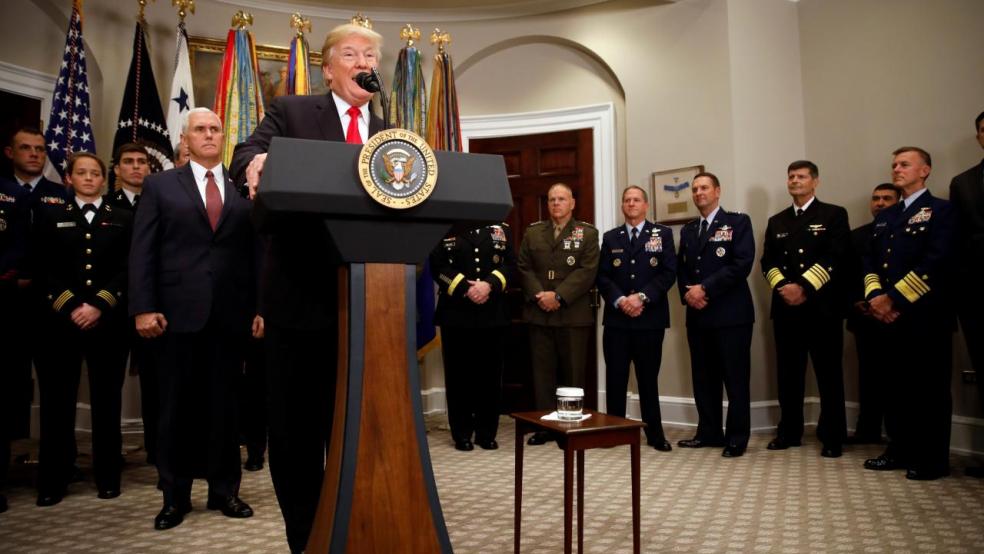
President Donald Trump signed into law the the National Defense Authorization Act (NDAA) for 2018 on Tuesday. The bill, which must be signed annually, sets policy and authorizes spending for the entire U.S. military. Trump signed the NDAA during a ceremony in the Roosevelt Room of the White House surrounded by high-ranking defense officials. Among its many provisions, the bill includes: Nearly $700 billion in topline funding for the military; The addition of 20,000 troops the Armed Services (Army, Navy, Air Force, Marines, Army Guard and Reserve, Naval and Air Reserve, and Air Guard); 2.4 percent pay raise for the troops — the largest in eight years; Provisions to improve our nation’s nuclear weapon program in light of continued threats from North Korea; Efforts to repair and improve our nation’s military infrastructure; Reforms to the military’s acquisition process; and Ends the “widow’s tax” and preserves special survivor allowance payments to more than 60,000 surviving military spouses. The 2018 NDAA also includes the authorization for three Littoral Combat Ships (LCS), which are built by Austal USA in Mobile, Ala. — a provision supported by Alabama 1st District U.S. Rep. Bradley Byrne. “With President Trump’s signature of the National Defense Authorization Act today, this is the beginning of the rebuilding of the U.S. defense forces after eight years in which we dangerously cut our armed forces, endangering the security of the American people,” Byrne said of Trump signing the NDAA. “This bill will help keep the American people safe, ensure our troops have the resources they need to defend our country, and support shipbuilding jobs right here in Southwest Alabama.” Alabama 3rd District U.S. Rep. Mike Rogers served as a conferee on the bill. “I was proud to see the National Defense Authorization Act for FY18 become law today with President Trump’s signature,” said Rogers. “This critical piece of legislation funds the Pentagon, takes care of our brave men and women in uniform and helps the Anniston Army Depot. This legislation also includes the transfer of 1911s to the Civilian Marksmanship Program (CMP) so they can prepare and sell the firearms to law-abiding citizens. I am proud to have served as a conferee on this important bill and pleased to see it become law.” The only issue with the bill is that it exceeds the spending caps set by the 2011 Budget Control Act to keep deficits under control. Until lawmakers agree to roll back the $549 billion cap, federal spending is limited. “The defense bill authorizes major investments in our military’s greatest weapon of all, its warriors,” Trump said at the bill signing. “Now Congress must finish the job by eliminating the [budget cap requirements] and passing a clean appropriations bill. I think it’s going to happen.”


